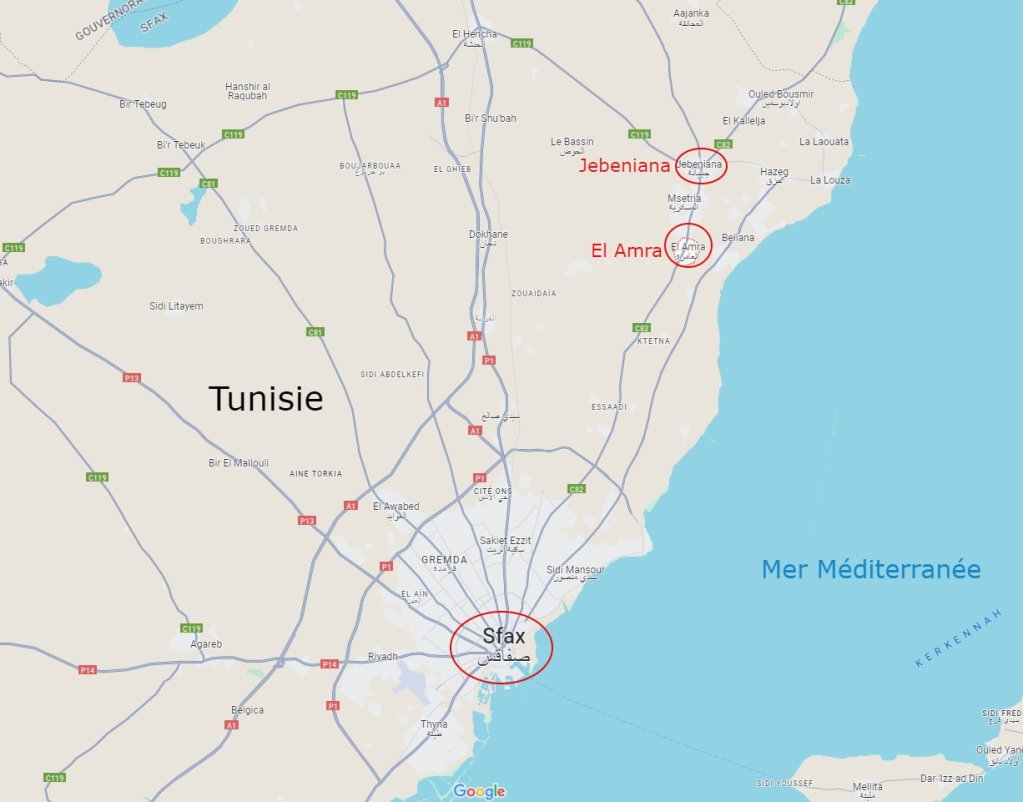Thousands of migrants from sub-Saharan Africa have gathered in the Tunisian governorate of Sfax with the objective of reaching Europe.
"My trip lasted seven months. I endured the worst -- thirst, hunger, fear, and danger. I left Ivory Coast for Mali and then Niger, where we gathered before crossing the Algerian desert and then going to Sfax in Tunisia," said an Ivorian man named Vincent, speaking to Tunisian news agency Tap about his journey with 40 others towards Europe.
His trip was cut short at sea by Tunisian authorities last weekend.
"I will never give up, no matter what happens," Vincent told Aymen Zemmali, a reporter from Tap who was on board a Tunisian coast guard vessel a few hours after Vincent's failed attempt to cross the Mediterranean.
"My objective is to reach Europe by all means, and only death will stop me," he said, his voice full of rage.
Sfax area full of migrants ready to depart
Thousands of irregular migrants have gathered in different areas and camps around Sfax. Their presence has become controversial and has raised doubts among the local population and in Tunisian public opinion.
"Tunisia is an African country and we don't want to stay here," said Haji, from Sierra Leone, to Tap. Haji lives in a camp in Henchir Ben Farhat, west of the district of El Amra. He speaks in an Arabic dialect mixing various Maghreb dialects.
Haji, acting as a spokesperson for the camp hosting thousands of sub-Saharan migrants, almost all of them undocumented, launched an appeal to Tunisian authorities: "We are going to Europe. Open a passage at sea."
Sfax, a serene region known for its economic dynamism along the Mediterranean coast, has become a popular destination for thousands of sub-Saharan Africans. People from Somalia, Sudan, and Cameroon are present across 17 makeshift camps in the areas of El Amra and Jebeniana, the smallest of which hosts 700 people and the largest thousands.
El Amra and Jebeniana have become keywords and the starting points for crossings of the Mediterranean.
Also read: Tunisia's Kerkennah Islands: A launchpad to Europe

More than 21,000 migrants stopped
In the first four months of 2024, the Tunisian coast guard has intercepted and rescued over 21,500 migrants trying to cross maritime borders towards Italy's coast and foiled 751 boat departures, according to the spokesman of the National Guard, Houssemeddine Jebabli.
According to the same source, the figure is higher than the number of departures prevented last year.
On May 11, Tap witnessed another Coast Guard operation in which 61 Sudanese nationals were rescued, including two women and two newborns. The Coast Guard cutters were reportedly forced to pursue the migrant boat for a long time, and they were able to approach them only after lengthy negotiations and after migrants allegedly hurled stones at the officials and threatened to throw their children into the water.
Sudanese migrants are reportedly the most represented "Arab" nationality on migrant boats departing from the coast of Sfax, over 65% of the total. Among sub-Saharan Africans, Guineans rank first with 18 percent, followed by Gambians, Malians, Burkinabe, and Ivorians, according to data obtained by Tap from well-informed sources who asked not to be identified.
Local population concerned
In the village of Hamayzia, near Aouabed beach, which hosts 700 people, encampments surrounding the village are increasingly close to the shore, resulting in damage to olive groves and crops and causing concern among landowners.
"Where are the authorities? Our land is occupied, and we can't even reach it and go around," denounced one of the landowners, holding a broken olive branch in his hand.
"We are looking for solutions by all means so that El Amra and Jebeniana will be given back to their people," said a civil society activist of El Amra, Mohamed Ben Farah, adding that "some sub-Saharans are cooperating, but others don't care, and they don't worry about the misery they can cause. They only care about getting ready to illegally take to the sea towards Italy's coasts."
According to the UN Refugee Agency UNHCR, over 9,000 refugees and asylum seekers are currently registered at the UNHCR office in Tunisia, hailing from sub-Saharan Africa, the Horn of Africa, and a number of countries in the Middle East. The majority of them reach Tunisia by land or by plane from neighboring countries.
Also read: Tunisia expels hundreds of sub-Saharan African migrants from Sfax amid crackdown
'We have received no support'
In the region of Sfax, thousands of sub-Saharan Africans have gathered, the great majority of whom are irregular migrants sought by their countries, refugees, or coming from countries not at war like Guinea and Ivory Coast, according to Noereddine Enneifar, an expert in strategic studies and global security.
In makeshift camps in El Amra and Jebeniana, food is sold at a high price, and "a certain number of sub-Saharan Africans have become experts in directly negotiating with humanitarian organizations in criminal schemes aimed at organizing migrant trafficking from their country and saving on the costs of irregular migration operations departing from Sfax," stated Noereddine Enneifar.
For his part, Haji, the migrant from Sierra Leone, said, "no organization has visited us, and we have received no support."
"We hear words but don't see any action," he denounced.
Also read: EU-Tunisia migration deal: Encouraging the people smugglers?
